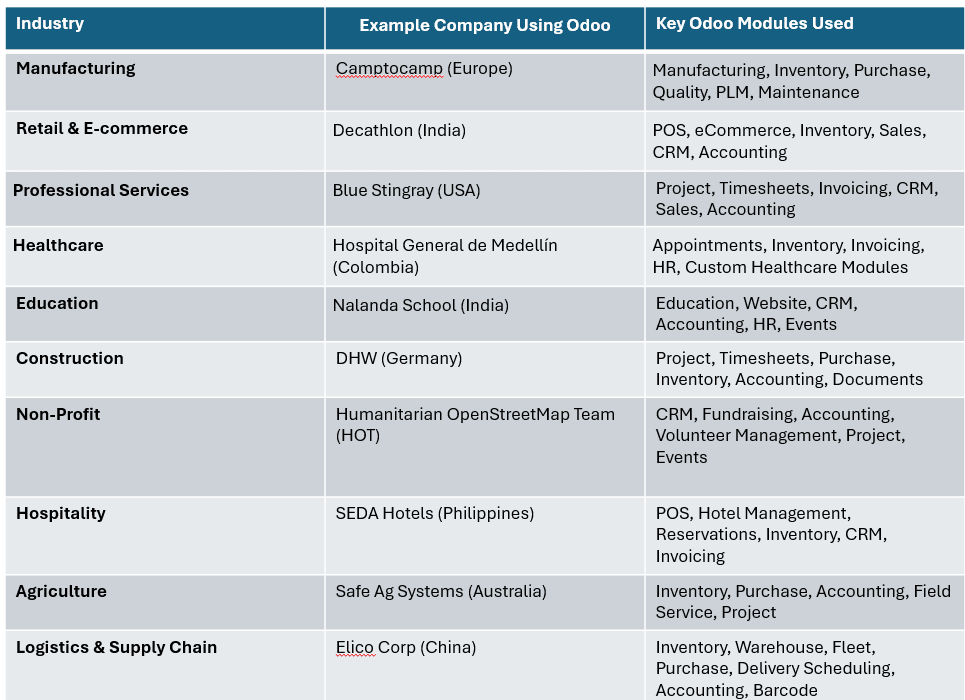In 2024, Odoo surpassed $650 million in revenue and expanded its global footprint to over 11,000 enterprise customers and 6 million users worldwide. This rapid growth underscores a clear trend—businesses are prioritizing platforms that offer flexibility, scalability, and integrated functionality.
Odoo stands out as a powerful all-in-one business management solution, combining CRM, accounting, inventory, e-commerce, and more into a unified, modular system. Its open-source architecture allows businesses of all sizes and sectors to customize operations without the overhead of traditional enterprise software.
From retail to manufacturing, healthcare to education, Odoo’s adaptability makes it a go-to platform for streamlining processes and driving digital transformation.
Curious to see how it supports different sectors?
Explore the guide below to discover how Odoo empowers 10 key industries.
Benefits of Odoo for Modern Businesses
There are often claims that Odoo ERP is ideal for small and mid-businesses. Odoo provides an all-in-one, modular business solution that adapts to diverse operational needs. Its flexible design and open-source foundation make it a powerful tool for scalable, cost-effective digital transformation.
Unified Business Management - Odoo integrates top ERP software, CRM, accounting, inventory, e-commerce, and more, eliminating the need for disconnected systems.
Modular and Scalable Architecture - Businesses can implement only the modules they need and scale effortlessly by adding more as operations expand.
Cost Efficiency - By consolidating multiple tools into one platform, Odoo significantly reduces software and maintenance costs.
Customizable and Extensible - Thanks to its open-source foundation, Odoo allows extensive customization to match specific business workflows.
User-Friendly Interface - Its clean, intuitive UI enhances productivity and ensures a shorter learning curve across teams.
Real-Time Data and Insights - Odoo offers centralized dashboards and reporting tools for better decision-making and operational visibility.
Community-Driven Innovation - Continuous enhancements from a global developer community keep Odoo updated with evolving business trends.
Streamlined Collaboration - With all departments working from the same platform, cross-functional collaboration becomes faster and more efficient.
Universal Benefits of Odoo Solutions for Industries
Before exploring specific industry applications, it's essential to understand the fundamental advantages that make Odoo valuable across diverse sectors.
Integration and Centralization
One of Odoo's greatest strengths is its ability to break down data silos that often plague modern businesses. By centralizing information from sales, marketing, operations, and finance departments, organizations gain a unified, real-time view of their operations. This integration eliminates the inefficiencies that arise when departments work with disconnected systems and outdated information.
Automation of Business Processes
Odoo significantly reduces manual tasks, human error, and operational costs through intelligent automation. From lead management and order processing to inventory updates and financial reporting, the platform automates routine workflows, allowing employees to focus on strategic activities that drive business growth. This also proves why Odoo is the best ERP for startups.
Enhanced Decision-Making Capabilities
Access to real-time data and comprehensive reporting tools empowers leaders to make informed strategic and operational decisions. Odoo's analytical capabilities provide insights that help businesses identify trends, optimize processes, and respond quickly to market changes.
Scalability and Flexibility
Whether supporting a growing startup or a large enterprise, Odoo adapts to changing business needs. Its modular structure allows organizations to add functionality as they expand, while extensive customization options ensure the system evolves with industry-specific requirements.
10 Industries That Significantly Benefit from Odoo Modules
The versatility of Odoo industry modules becomes apparent when examining how different sectors leverage the platform to address their unique challenges and opportunities.

1. Manufacturing
Manufacturing companies benefit enormously from Odoo's comprehensive production management capabilities. The platform optimizes production planning, controls inventory, manages bills of materials (BOMs), tracks work orders, and ensures quality control throughout the manufacturing process.
Key manufacturers use Odoo to streamline complex processes from raw materials procurement to finished goods delivery. The system's ability to handle multi-level BOMs, track production costs, and manage supplier relationships makes it particularly valuable for companies with intricate manufacturing workflows.
2. Retail & E-commerce
The retail sector finds exceptional value in Odoo's integrated approach to online and offline sales channels. The platform seamlessly manages online stores through its e-commerce module while supporting physical retail locations with comprehensive Point of Sale (POS) functionality.
Retailers can efficiently manage inventory across multiple channels, track customer relationships, and handle order fulfillment from a single platform. This integration ensures that whether customers shop online or in-store, they receive consistent service and accurate inventory information.
3. Professional Services
Consulting firms, IT companies, and marketing agencies leverage Odoo's project management capabilities to enhance their service delivery. The platform excels at project management, timesheet tracking, invoicing, client relationship management, and resource allocation.
Professional service providers use Odoo to efficiently manage complex projects, track billable hours, maintain client relationships, and streamline their billing cycles. The system's ability to provide real-time project visibility helps agencies deliver projects on time and within budget.
4. Healthcare Healthcare organizations, including clinics and small hospitals, utilize Odoo to enhance operational efficiency and patient care coordination. The platform manages patient information, appointment scheduling, medical supply inventory, and billing processes.
Healthcare providers benefit from Odoo's ability to integrate with Electronic Health Records (EHR) systems, ensuring seamless information flow between administrative and clinical operations. This integration improves patient care while reducing administrative burden.
5. Education
Educational institutions, from schools to training centers, use Odoo to centralize their administrative tasks. The platform manages student enrollment, course administration, attendance tracking, fee management, and staff HR functions.
Educational organizations find that Odoo's communication tools and reporting capabilities help them better serve students and parents while maintaining efficient administrative operations. The system's flexibility allows institutions to adapt to changing educational requirements and regulations.
6. Construction
Construction companies leverage Odoo's project-centric approach to manage complex construction projects effectively. The platform handles project planning and tracking, procurement, equipment management, worker timesheets, and project-specific financial management.
Construction firms benefit from Odoo's ability to track project progress, manage resources, and control budgets across multiple simultaneous projects. The system's mobility features allow field workers to update project information in real-time, improving project visibility and coordination.
7. Non-Profit Organizations
Non-profit organizations use Odoo to optimize their operations and maximize their impact. The platform manages donor relationships, fundraising campaigns, volunteer coordination, grant tracking, and financial accounting with transparency requirements.
NPOs appreciate Odoo's cost-effectiveness and its ability to provide detailed reporting for stakeholders and regulatory compliance. The system helps organizations demonstrate their impact and manage resources efficiently to further their mission.
8. Hospitality
Hotels and restaurants utilize Odoo to streamline both guest-facing and back-of-house operations. The platform manages reservations, front desk operations, restaurant POS systems, food and beverage inventory, and guest relationship management.
Hospitality businesses benefit from Odoo's ability to provide personalized guest experiences while maintaining efficient operational processes. The system's integration capabilities ensure that guest preferences and operational data flow seamlessly between departments.
9. Agriculture
Agricultural businesses and farms use Odoo to bring digital efficiency to traditional farming operations. The platform manages crop planning, livestock tracking, seed and fertilizer inventory, produce sales, equipment maintenance, and financial tracking.
Agricultural operations benefit from Odoo's ability to track seasonal cycles, manage supply chains, and provide insights into farm profitability. The system helps farmers make data-driven decisions about crops, resources, and market opportunities.
10. Logistics & Supply Chain
Logistics companies and supply chain operations leverage Odoo's comprehensive warehouse and inventory management capabilities. The platform manages warehouse operations, inventory tracking, fleet management, delivery scheduling, procurement, and supplier relationships.
Logistics operations benefit from Odoo's ability to optimize the entire supply chain from sourcing to delivery. The system's real-time tracking and reporting capabilities help companies improve efficiency, reduce costs, and enhance customer satisfaction.
Key Odoo Modules for Industry-Specific Needs
Understanding the specific Odoo industry modules available helps businesses identify which components best serve their operational requirements.
Core Business Modules
The CRM module serves as the foundation for sales, marketing, and customer service across all industries. The Sales module handles quotes, orders, and sales analysis, while the Inventory module provides comprehensive warehouse management and stock tracking capabilities.
Specialized Industry Modules
Manufacturing companies rely heavily on the MRP (Manufacturing Resource Planning) module for production planning and work order management. Retail businesses utilize the Point of Sale and E-commerce modules for comprehensive sales channel management. Professional services benefit from the Project module's task management and timesheet tracking capabilities.
Support and Administrative Modules
The Accounting module provides comprehensive financial management, while the Human Resources module handles employee management and payroll. Specialized modules like Fleet management and Field Service address specific operational needs across various industries.
Understanding the Cost of Odoo Industry Solutions
Implementing Odoo requires understanding its flexible pricing structure and the factors that influence the total cost of ownership.
Pricing Models
Odoo offers two main pricing approaches: the free Community version for organizations with technical expertise, and the subscription-based Enterprise version that includes additional features, hosting, and support. The choice between these options depends on technical capabilities, support requirements, and desired features.
Cost Factors
Several factors influence Odoo implementation costs, including the number of users, required modules, customization needs, hosting preferences, and implementation services. While initial costs vary, organizations typically find that Odoo's integrated nature leads to significant long-term savings and return on investment.
Odoo: Your Catalyst for Growth, Empowered by Sedin
Odoo's strength lies in its flexibility and end-to-end functionality, making it a powerful tool for business transformation across various industries. Its modular nature enables organizations to scale at their own pace, eliminating the complexities of fragmented software systems.
At Sedin Technologies, we elevate Odoo from a mere software deployment to a strategic alignment with your real business needs. We specialize in tailoring Odoo industry modules to address the unique operational challenges of different sectors – be it optimizing a retail supply chain, automating manufacturing workflows, or streamlining healthcare operations. Our team ensures each module is configured for maximum impact.
From initial consultation and gap analysis to customization, deployment, and post-launch support, we manage the entire lifecycle. Our hands-on, consultative approach and trusted Odoo partnersensures faster ROI, reduced risk, and a seamless transition to smarter, integrated operations. When you partner with Sedin, you're not just getting a tech upgrade; you're translating your strategic goals into scalable, efficient systems ready for the fast-moving digital economy, unlocking Odoo's full potential for future-ready growth.




